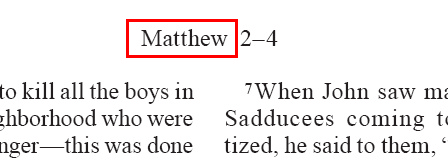Identification¶
\id¶
- Syntax
\id_<CODE>_(Name of file, Book name, Language, Last edited, Date etc.)- Type
paragraph
- Added
1.0
- Use
File identification.
This is the initial USFM marker in any scripture text file.
CODE is a standard 3 letter scripture book abbreviation.
Text and Formatting Sample
\id MAT 41MATGNT92.PTX, Good News Translation, June 2003
The text following this marker is not normally used in any formatted presentation.
\ide¶
- Syntax
\ide_<ENCODING>- Type
paragraph
- Added
1.0
- Use
An optional character encoding specification.
This marker should be used to specify the character encoding of the text within the file. For example: CP-1252, CP-1251, UTF-8, UTF-16, OR Custom <specify font name>. If the character encoding does not conform to a known standard, but is rather a customized solution for the project, a minimum of the name of the font used for the project should be included. For archive purposes, texts which rely upon a custom encoding solution should be converted to Unicode, if at all possible.
Text and Formatting Sample
\ide UTF-8
\ide CP-1252
\ide Custom (TGUARANI.TTF)
The text following this marker is not normally used in any formatted presentation.
\sts¶
- Syntax
\sts_<STATUS CODE>- Type
paragraph
- Added
1.0
- Use
Project text status tracking.
The contents of the status marker can be defined by the downstream system being used to track project status.
Multiple status entries can be contained in a book to indicate that various portion of the text are present with different draft levels. If an entire book is complete at a given status level, only one status entry is required.
Text and Formatting Sample
\sts 2
The text following this marker is not normally used in any formatted presentation.
\rem¶
- Syntax
\rem_text...- Type
paragraph
- Added
1.0
- Use
Remark.
For adding brief comments by a translator, consultant, or support person. The text is not a type of footnote and is not intended for publication.
Text and Formatting Sample
\rem Assigned to <translator's name>.
\rem First draft complete, waiting for checks.
The text following this marker is not normally used in any formatted presentation.
\h¶
- Syntax
\h_text...- Type
paragraph
- Added
1.0
- Amended
3.0
- Use
Running header text.
Deprecated use of numbered variable syntax (i.e. use is strongly discouraged).
The variable # in\h#_text...represented distinct components or levels of text required for the running header presentation (e.g. inside, outside, sub-division/section etc.).
Text and Formatting Sample - Matthew (GNT)
\h Matthew

\toc#¶
- Syntax
\toc1_text...- Type
paragraph
- Added
2.03, 2.04 (\toc3)
- Use
Long table of contents text.
- Syntax
\toc2_text...- Use
Short table of contents text.
- Syntax
\toc3_text...- Use
Book abbreviation.
Text and Formatting Sample - Matthew (GNT)
\h Matthew
\toc1 The Gospel According to Matthew
\toc2 Matthew
\toc3 Mat

\iex¶
- Syntax
\iex_text...- Type
paragraph
- Added
1.0
- Use
Introduction explanatory or bridge text (e.g. explanation of missing book in a short Old Testament).